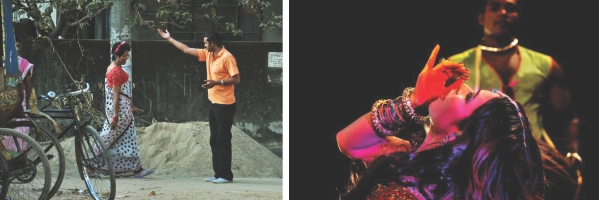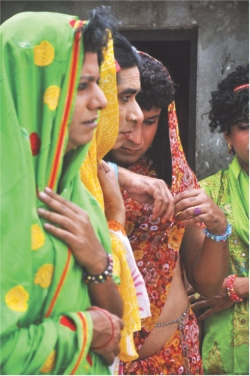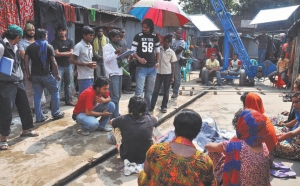| Home - Back Issues - The Team - Contact Us |
 |
| Volume 11 |Issue 29| July 20, 2012 | |
|
|
Cinema Silence Beneath the Glitz Noman Robin's 'Common Gender' is a bold attempt to tell the story of transgender people using the Dhallywood formula Tamanna Khan The initial hoots and whistles almost die out towards the end of the two and a half hour show. All that can be heard in the hushed up hall are muffled sniffles. The groups of young people, chattering so cheerfully at the beginning of the film, leave the hall in silence, probably reevaluating their perception of the 'common gender' — the hijra community. 'Common Gender', a film based on the love story of a transgender individual is hardly a conventional topic for Bangladeshi commercial cinema. However, young and debut film-director Noman Robin has dared to tread such an unorthodox area. Not wanting to label 'Common Gender' as an art film, he along with the producer and distributor ER Cinema, made a conscious decision of running the shows in conventional mainstream cinema halls, accessed by people of all classes. “I am thankful that my producer agreed to finance a film without any film stars like Shakib Khan or Apu Biswas or even a heroine. I am surprised that people have accepted the film. But I always believed in myself and they trusted me,” Robin expresses his gratitude. In spite of the absence of big stars and stereotype hero-heroines and villains, 'Common Gender' has all the ingredients of a Dhallywood film — love, separation, item song, love song, separation song, fighting. Even the character of Tota Mia, a friend of the hijra community, fills up the place of the usual Dhallywood jest — a fool with a regional accent trying to say smart things.
However, beyond all the glitter and the gaudy banner of the film, lie the true stories of many hijras, who Robin has met while researching for the film. Robin first thought about doing something for the transgender community, when he witnessed a hijra been beaten at a shopping mall for trying to use the toilets — meant only for male or female. Even after she offered money to allow her right of entry, she was denied. The incident touched Robin so much that later when he made the film he included it along with other real-life incidents like the story of Shahzadi mashi, the hijra who was persecuted for adopting a daughter.
The cast, mostly from television and theatre, have tried their best to portray the life of the hijras— the everyday realities they face and their struggle to survive in a hostile society. In fact, Sushmita's (played by Shazu Khadem) love story becomes secondary amongst the other issues that come up in the film. The film depicts the conventional ways hijras earn their living as well as the illegal business they are forced to engage themselves in like any other marginalised community. Thus while most of them are seen extorting at shops and markets and dancing at weddings to earn a negligible income, Tushi, a character in the film envied in her group, is said to have a different source of earning. Although Tushi's earning source is not explicitly shown, her connection with hijackers from who she successfully retrieves Sonjoy's, (Sushmita's lover) phone, establishes her involvement in illegal activities. Unfortunately, in trying to include the multi-faceted problems, hijras face in our conservative, rigid society, 'Common Gender' suffers from a smooth transition of scenes at some instances. The film begins with the depiction of shame felt by a family that abandoned their transgender child. However, the audience is left in the dark till the end of the film about the relationship of the initial characters to the rest of the cast. Only after Sushmita's death, the director does justice to Bubli's character and gives relevance to the first scene. Though such surprises are interesting in novels, for this film it appears irrational and out of place. Shahazadi Mashi's story seems equally out of place in a dialogue when the sequence is about solving the fued between two rival groups of hijras. Robin could have used the story in some other place perhaps when Sushmita talks about his own motherly instinct to Sonjoy. In the same way, the visit by the religious Muslims of the neighbourhood trying to befriend the hijra community could have worked better had there been a follow-up sequence depicting whether these friendly people could actually keep their word.
Although the performers have done an excellent job in the roles of transgender people, the same cannot be said of the performers playing the roles of the family members. In spite of their experience, the acting in the first scene is not convincing. In fact, Bubli's mother's effort to meet her child also appears unreal. Similarly, casting Rozi Siddiqi in Sushmita's mother's role also has not been realistic. Rather she could have switched places with the guest actress Dolly Zohur. However, all other acting flaws is compensated by Dilip Chakraborty's balanced and credible portrayal of Bubli's character. It is actually his performance especially in the second last scene that breaks down all emotional reservation. In fact, the director should have ended the movie there instead of adding yet another scene. But then he probably wanted to show that hijra's hope to find justice in the after world. Noman Robin has not only tried to break our society's conventional perception towards the transgender community through his film, he reminds us that they too are part of our community. Naming his film 'Common Gender', he tries to point out that it is not the transgender people who are uncommon rather it is us, people who are afraid to accept Shusmita, Bubli and the rest, in our society. Noman wishes to use part of the money from his film to make arrangement for the after death service of the hijra community, who currently, irrespective of their religious belief, are not allowed burial or cremation grounds of any religious community. It is said that the silver screen is the most powerful media in reaching the masses. Robin, with a lot of courage and hope, has opted to use this media to send a social message about something that is hardly talked about. Only time can tell if he has been successful in his endeavour.
Copyright
(R) thedailystar.net 2012 |


